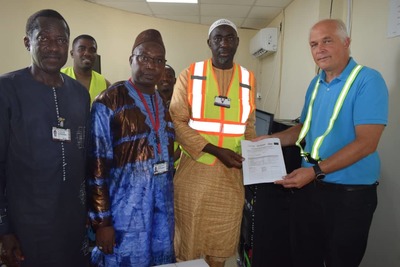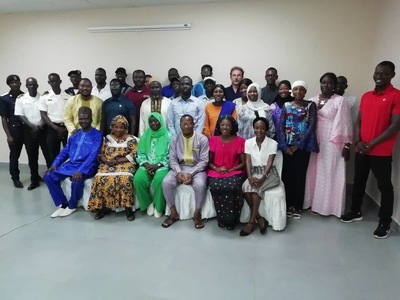Core responsibilities:
- To monitor, control and surveillance of fishing operations.
- Advise the Administration.
- Sensitize the fisher communities about sustainable fishing practices.
- Working with key stakeholder Institutions especially The Gambia Navy.
- To sensitize fishermen about sustainable fishing through GRTS / Radio / Community Fish Landing Sites etc.
- Pre-Inspection of fishing gears of fishing vessels.
- Measurements of fish size.
- Inspection of fishing materials at the Ports/ stores / fishing communities / at sea / river etc.
- To ensure that appropriate fishing gears and materials are used in all fisheries.
- To provide list of licensed fishing vessels to The Gambia Navy.
- To confirm offense and prepare reports.
- Inspection of mesh / hook sizes.
- Measurement of the fish species.
- Check the log book to confirm the fishing position / catch by fish species etc.
- Information from the Fisheries Observer.
MCS tackles illegal, unreported and unregulated fishing activities happening at sea within the Gambian territorial waters, so as to ensure sustainable exploitation and utilization of the fisheries resources.
The Monitoring, Control and Surveillance (MCS) unit in collaboration with the Gambian Navy conduct surveillance activities within the territorial waters of The Gambia. The Gambia Navy is responsible for enforcement of the fisheries laws relating to illegal, unreported and unregulated fishing through patrols, but obtains information on vessels from the Fisheries Department prior to any outing.
Observer Program
Through its observer program, the MCS Observers charged with the responsibility of collecting catch data onboard on licensed fishing vessels and report to Government any illegal, unreported and unregulated fishing activities happening at sea within the Gambian territorial waters.
As part of their duties, observers ensure compliance to the Fisheries Regulation and Act. They also make sure agreements are respected and followed. Maritime Surveillance Inspections are conducted, and a register kept of infringements and violations and reported back to MCS Unit.
Pre-Licensing Inspection
The MCS unit also carries out pre-licensing inspection to all fishing vessels seeking for fishing license. The unit monitors on daily basis and maintains a register of licensed fishing vessels, which is updated and given to the Navy when they are going out on patrols. In the course of the patrol vessels arrested in violation of the law are apprehended and escorted to the port and will be inspected by the MCS.
Pre-licensing inspections are important to ascertain the vessel’s compliance with the Fisheries Act. 2007. and the Fisheries Regulation 2008.The inspection includes the checking of nets and gears to ensure nets are of a size permitted and no illegal attachments, vessel papers, certificates, radio communication set, display of name and callsign, tonnage and seaworthiness certificate are all examined, and copies of which are kept in ship files for reference.
Core responsibilities:
- Responsible for Aquaculture proliferation and diversification in the country;
- Provide technical support and advice to Aqua culturists;
- Provide support in the identification of suitable sites for different Aquaculture Production Practices;
- Conduct Research in different aspects of Aquaculture;
- Assist fish farmers in the design of fish ponds and related facilities;
- Assist fish farmers in selecting appropriate fish species in different culture environments;
- Conduct Aquaculture training programs to fish farmers and hatchery workers;
- Collect Aquaculture data;
- Collaborate with other Institutions/Ministries/Departments/Agencies in implementing the Aquaculture components of their projects;
- Provide technical advice on feed formulations for different fish species and categories;
- Provide quality seeds/fingerlings to fish farmers at affordable prices; and
- Provide status reports on Aquaculture.
An effective national food (fish) control system is essential to protect the health and safety of consumers. The food trade places obligations on importing as well as exporting countries to implement and enforce risk-based food control strategies. It is therefore vital to ensure that imported foods conform to national import requirements as well as to conform to requirements of export countries through food quality inspections.
Core responsibilities:
- Promote the use of GPS (Global Positioning System) to mark coordinates of fishing areas and plot on the map to specify areas of fishing for purpose of traceability.
- Inspection of fishing canoes and industrial vessels.
- Landing sites inspection (Hygiene, environmental conditions, safety of operations and suitability of -containers for offloading fish). Inspection and monitoring of implementation of Good Hygienic Practices at landing sites, vessel, transport vehicles, and markets.
- Facilitate the fencing of landing sites to exclude animals.
- Develop manual of operations for fish landing sites.
- Sampling of fish for laboratory testing.
- Training of Inspectors on Fish biology and determination of hazards associated with fish spoilage.
- Training of fish operators along the fisheries value chain on Good Hygienic Practices and Good Manufacturing Practices
- Display visual aids at all landing sites that depict good fish handling practices.
Activities & Achievements
- The Enhanced Integrated Framework Programme training on Good Hygienic Practices (GHP), Good Manufacturing Practices (GMP) and improved fish handling of fisheries value chain conducted;
- Routine inspection of fish processing establishments to ensure compliance with international food safety standards for export was carried out at The Atlantic Seafood Company c/o Barra Fishing Company, Rosamond Trade and International Pelican Seafood;
- Product inspection certificates issued to fish processing plants and for fishery products destined for exports to EU and non EU countries;
- Inspected fish landing sites issued with certificates on safety of products for vendors exporting fisheries products to West Africa sub-region
- Over 100 fish operators sensitized and trained on GHP and GMP in fish handling;
- Fishermen and post-harvest operators at landing sites and fish markets sensitized on the importance of GHP and GMP in fish handling along the fisheries value chain;
- Awareness raising aids on good and bad practices in fish handling developed and displayed in the form of posters and pictures at fish landing sites and fish markets; and
- Sanitation procedures on fisheries operations, premises, equipment and utensils conducted for value chain operators.
Fish stocks are renewable resources but could be depleted if exploitation levels are not controlled. It is therefore important to assess their status such as level of abundance, seasonal occurrence and level of exploitation through regular monitoring, collection and analysis of catch data and periodic surveys.
The main objective of the R&D unit is to increase knowledge of the fish stock and the use of this knowledge to devise new applications in management and governance of the fisheries resources using scientific methods. Additionally, R&D has relevance given the environmental and social state in fisheries. It can develop effective policies and management approaches for the rehabilitation, protection, enhancement and long-term sustainable exploitation of fisheries resources and the alleviation of poverty in the coastal areas.
Core responsibilities:
- Undertaking research and surveys to establish the potentials and biomass levels of the demersal and pelagic fish ressources ;
- Strengthen capacity of the Fisheries Field Assistants on fisheries data collection and sampling methods;
- Creation of Statistical data base for processing, analyzing and reporting of all fisheries data;
- Conduct Catch Assessment Survey in collaboration with Extension Unit;
- Responsible for conducting stock assessment survey;
- Monitoring of Fish market prices;
- Advising the Department on the status of the fisheries resources; and,
- Reporting of the yearly statistics on Production and Export.
- Processing, analyzing and reporting of the fish production from artisanal and industrial fisheries subsectors
- Regularly consult with other heads of unit
- Prepare and submit monthly activity report
- Visiting the landing sites to monitor data collectors, see current problems and see how to alleviate them
The extension unit is one of the key pillars of Fisheries Department responsible for designing and implementing activities geared towards achieving the goals and objectives of the Department.
Core responsibilities:
- Conservation and management of fisheries resources;
- Disseminate research and development findings to extension staff and fisher folk in the field; and
- Organise fishers into fisher folk co-operatives to help combat IUU fishing in coastal and inland waters.
Achievements;
- Initiation of nationwide registration of artisanal fishing canoes;
- Establishment of data base on artisanal fishing vessels/canoes for monitoring fishing efforts and to keep track of IUU fishing in coastal and inland waters;
- Establishment of District Fisher Folk Associations at JanjangBureh, Bansang, Niamina East and Niani in CRR;
- Formation of District task forces in JanjangBureh, Kudang, jareng, Bansang and Niani in CRR to combat IUU fishing in inland waters;
- Organized and sensitization 300 regional fisher folks nationwide on the impact of climate change on fisheries and aquaculture activities in collaboration with NEA;
- Organised a Radio and TV panel discussions in collaboration with NEA to raise awareness on the impacts of climate change on culture and capture fisheries;
- Convened meeting with Kanikunda (NBR) fishing community to discuss issues pertaining to the ban of foreign fishers to fish at the inland waters and IUU fishing;
- With the collaboration of Barra fishing community, conducted sea patrols to combat IUU fishing;
- Trek along the coast to monitor field staff and meet with fisheries centre management committees


